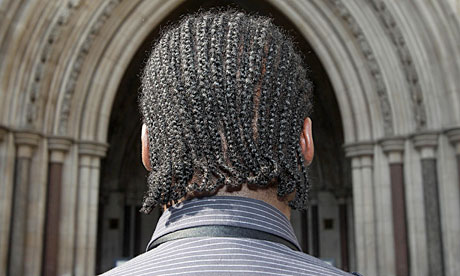
An 11-year-old boy who was turned away on his first day at secondary school for wearing his hair in cornrows, has won his case at the high court after a judge ruled the school's policy resulted in "indirect racial discrimination".
The boy, now aged 13, was refused entry to St Gregory's Catholic Science College in Kenton, Harrow, north London http://www.guardian.co.uk/uk/london - in September 2009 because his hairstyle did not comply with the strict uniform policy. The school only allowed a conservative "short back and sides" hairstyle for boys amid concerns that other styles could encourage "gang culture".
But at the high court in London on Friday , Mr Justice Collins said that although the school's "short back and sides" policy was "perfectly permissible", it should have taken into account individual pupils' family traditions.
"There are a number of Afro-Caribbeans for whom cutting their hair and wearing it in cornrows is a matter of their cultural background ... and can work against them on the basis of their ethnicity," said Collins.
"There is no question of this school being in any way racist. This was an honest mistake ... it was an error. But I am satisfied that if the policy is applied without the possibility of exception, then it is unlawful. I have decided that there was unlawful indirect racial discrimination that was not justified."
The court heard the boy, known only as G, had not cut his hair since birth and wore his hair in cornrows as part of a family tradition. In a statement to the court, he said he was shocked at the school's decision, adding that all the male members of his family wore their hair in cornrows.
"I really like my hair and it's been that way all my life. This problem at school was the first time me and my mum ever talked about my hair, it's so normal to us ... I really like my hair, my brother and dad have cornrows and we all like it. I really don't want to cut it off. This was the first time I had to ask the question, 'what's wrong with my hair?'"
His mother told the court the style was "of great importance to his cultural and racial identity", adding that her son, who had been looking forward to starting secondary school, suffered a "major blow to his self-esteem" after being turned away minutes after arriving.
The school said the ban on the cornrows hairstyle was part of its strict uniform code designed to deter gang culture and create a safe environment for all its pupils.
Andrew Prindiville, who has been headteacher at St Gregory's since September 2008, defended the decision to adopt "a traditional schoolboy haircut or a 'short back and sides'", saying the school served an area where there was gun and knife crime, much of it gang-related, and haircuts were often "badges" of gang culture.
"Our uniform and haircut policy for students other than sixth formers is a critical part of our strategy for maintaining excellent behavior, for keeping gang mentality out of the school and for ensuring that students do not adopt attire or haircuts that may encourage that mentality," he told the court.
Prindiville said that although there was no specific connection between cornrows and gang culture, any exception to the strict rules on hairstyles could lead to a breakdown in discipline.
"For example, the school ban on shaven heads is part of a conscious determination to avoid white boys, whether English or, say, eastern European, adopting any form of 'skinhead' styles with all the negative, and sometimes racist, connotations that go with this".
But Mr Justice Collins said the school, which is rated as excellent by Ofsted, must make exceptions in the future on the basis of ethnicity or cultural beliefs. The judge added that he would not rule if the boy's banning from the school was unlawful, adding that an ongoing county court case, if the family chose to pursue it, would decide that.
After the ruling, the family's solicitor, Angela Jackman, from Maxwell Gillott, said: "This is an important decision. It makes clear that non-religious cultural and family practices associated with a particular race fall within the protection of equalities legislation."
She added: "For G, wearing his hair in cornrows is a fundamental cultural practice, which would have had no adverse impact upon the school. His wishes, however, were dismissed by the school without any consideration. Whilst schools http://www.guardian.co.uk/education/schools - face the challenges of maintaining good discipline, a community environment and their particular ethos, this case is a reminder that they must do so within the boundaries of the law."
In a statement after the ruling, Prindiville and chairman of governors Alloysius Frederick said the school had always tried to ensure that its uniform policy was fair, and offered its best wishes to G and his mother.
"We believe that St Gregory's is a happy and successful school with highly supportive parents and with a student body fully reflective of the racial diversity of the local community."
They added: "[We are]
naturally disappointed by this decision of the high court. St Gregory's
is proud of its rich cultural and ethnic diversity, and is run on the
belief that everyone at the school is equal and made in the image of God.
"The school's governing body will now consider whether to apply to the court of appeal for permission to appeal against the judge's determination."
In a statement to the court, G, who is now at another school, said: "I love my [new] school, everyone is different and the teachers only care that I am learning – they don't have a problem with the way I look."